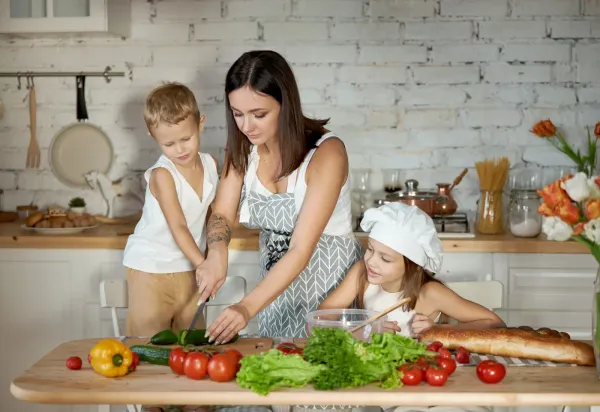Parenting is a beautiful thing. It’s a hard thing, sure, but it’s also quite literally what makes the world go round.
It can be such a joy-inducer and light provider, and offers much purpose in an adult’s life, whether young or old, no matter the way in which they came into being a parent.
However, we often don’t define parenting well.
“Children are educated by what the Grown-up is and not by his talk.” — Carl Jung
So many parents are thrust into their new life without ever being told what exactly is expected of them or needed from them, nor how to go about exactly being a parent.
Without an effective definition, they don’t know what they’re supposed to do, or even who they need to be to their child.
As a result, people often fall into automatic reactions and roles based off of how they were raised, or the bits and pieces they see from other parents or through television shows and movies.
With not much to work with, they simply go off of what they know.
While there’s no one size fits all way to parent, and every child is different, there are a few roles and functions that parents can fill. I believe looking at these can offer a little insight into the parenting process, and can help any parent look at their relationship with their child from a momentary birds’ eye view.
#1: Protector
I think that first and foremost most parents think of themselves as protectors, and this is certainly an important function for them.
Parents protect their children from all sorts of things.
They provide for them, and protect them from physical danger, as well as emotional and social danger through promoting friendships and prosocial behavior.
Parents can also serve as protectors when it comes to the online world, ensuring that their children are consuming wholesome and beneficial content as they age.
“If children feel safe, they can take risks, ask questions, make mistakes, learn to trust, share their feelings, and grow.”— Alfie Kohn
This is where things like rules, boundaries, technology limits, curfews, and punishments come into play. I think it’s important to remember that safety is, ultimately, the reason behind punishment, as well as moral shaping.
You ground your kid for being gone too late because that’s not safe, and if they aren’t respecting you and your rules, who knows what they could get into.
We punish kids for not listening or heeding expectations because we don’t want anything to happen to them as a result of shirking parental influence.
As a parent, be proud of your protective role and strive to do it out of love and proactivity, rather than fear.
You cannot protect your child from everything, but you should certainly strive to create a loving and safe environment in which they can grow, learn to love themselves, and shoulder adversity as it comes.
#2: Emotion coach
Psychologist and researcher, John Gottman, in his book Raising An Emotionally Intelligent Child: The Heart of Parenting, talks about the concept of emotionally coaching your children in a fascinating way.
He probes into this underrepresented function of parents and explains how good parents help their kids understand and learn about their emotions.
“…research studies show that expressing empathy while giving kids the tools to label their emotions with words not only helps to heighten their confidence in dealing with everyday problems, but is also effective in soothing their nervous system and allowing them to recover faster from stressful events.” — The Gottman Institute
The heart behind the idea is to model emotional maturity yourself so that your child will know how to respond to their own emotions.
The five steps are as follows: (1) cultivate awareness about your child’s emotion(s), (2) lean into the moment and embrace it as an opportunity, (3) validate your child’s feelings and actively listen, (4) enable your child to label their emotions, and (5) help your child to positively deal with the emotion that they’re feeling.
As an emotion coach, you aren’t trying to suppress, change, or ignore your child’s feelings, or quickly appease their needs so that the emotion will go away.
Instead, you’re wholeheartedly leaning in and helping them to become more in tune with how they’re feeling, as you grow to understand them yourself.
Parents who do this well don’t see their child’s emotions as a nuisance or something to simply deal with, but as opportunities to cultivate a deeper relationship and to improve their child’s emotional intelligence.
#3: Supporter & encourager
You are, hopefully, the biggest voice in your child’s life beside their own internal one.
This means that your child is constantly looking to you for support and encouragement. Be their biggest fan. Let them see and feel that.
This looks like a lot of things.
It can be literal, and mean showing up to their game and performances and cheering no matter what. It can also mean supporting them in doing things that are hard, or in leaning into the discomfort when they’re trying something new.
“Before playing with his equals, the child is influenced by his parents.” — Jean Piaget
I think what a lot of parents forget is how much of an impact they have on their child. Your child notices when you’re not impressed, or when you look hopelessly on their work, dreams, and plans, however small they might be.
As a parent, support your child. Let them know that you’re in their corner cheering them on, and stand ready to help when you can and provide emotional support even when you can’t give anything else.
“Children cannot be fooled by empty praise and condescending encouragement. They may have to accept artificial bolstering of their self-esteem in lieu of something better, but what I call their accruing ego identity gains real strength only from wholehearted and consistent recognition of real accomplishment, that is, achievement that has meaning in their culture.” — Erik Erikson
I can think of countless stories of athletes, writers, successful students, and individuals who have overcome adversity, citing so much of their success to the fact that their mom or dad was always ready to support them.
#4: Teammate
One of the most beautiful patterns I see amongst cohesive families is this idea of the family unit being a team. Families that operate this way wear their last name as a banner, and have this unspoken togetherness that permeates every interaction.
“We will practice courage in our family by showing up, letting ourselves be seen, and honoring vulnerability. We will share our stories of struggle and strength. There will always be room in our home for both.” — From Brene Brown’s Wholehearted Parenting Manifesto
They are together, a team, with members of individual skills and abilities working together towards the same goal.
This team mindset enables a mutual support of each other that everyone exemplifies, and all members are understanding of one another. They rally around similar goals and efforts, and simultaneously shun anything that’s not in line with their family values.
Parents who are aiming to embody all of their functions well function specifically as a teammate to their child. They let their child participate with them in things, and also saddle up next to their child on the projects that are most important to them.
This can often look like involving children in family-wide service projects, letting them assist in home renovation projects, or asking children for ideas on the next family vacation or family movie night.
It can be as simple as letting your kids run around the grocery store, helping you find the ingredients for dinner more quickly.
The goal of being a teammate to your child is not only to simply have a good relationship with them, but to engage them in more mature thinking and planning, and to give them a taste of the more interesting sides of adulthood as they get older.
It will also give your child more empathy for what you as the parent has to juggle.
#5: Friend
I know, I know. This one’s a little controversial. For some reason or another, people don’t like it when it’s suggested that parents should be friends with their kids, and perhaps I understand why.
There’s a general assumption, from a long history of parenting going this way, that parents need to be stern dictators in their home and not allow any wiggle room for anything or they’ll lose their control.
Parents need to be in charge. They need to be leaders, and lawmakers, and love as a parent should love. Let me be clear, I’m not calling on parents to be peers with their children, but I am calling on them to be friends.
“It’s a long haul bringing up our children to be good; you have to keep doing that […] You have to learn where you stand, and make sure your kids learn [where you stand], understand why, and soon, you hope, they’ll be standing there beside you, with you.” — Erik Erikson
A friend is someone who you have great regard for, and enjoy being around. They’re someone who is there to support you, there to lean on, and there to spend quality time with.
While appropriate boundaries should always exist between you and your kids, they should also know that you’re a human being with thoughts and feelings and imperfections.
You can tell them when you’re having a hard time, or you’re sad, or disappointed at something as little as Target not having your favorite ice cream flavor.
Sharing these human moments with them will not only build their emotional intelligence and tolerance, but create an environment in which they can more comfortably share with you.
“To love someone is to strive to accept that person exactly the way he or she is, right here and now.” — Mister Rogers
Finally, I think that being a friend to your child does contribute to having lots of quality time with them which can strengthen your individual relationship and the cohesion of your family.
My hope and prayer for you is that your children can grow into little people that you actually like and want to spend time with.
This can be through a game that you play together, a TV show that you share when they get a little older, or through a project you’re both working on.
Seeing your child at least partially as a friend and buddy as they get older helps to humanize both of you, and lean away from the dogmatic ideas of parent-child relationships that I think have persisted for too long.
“At the end of the day, the most overwhelming key to a child’s success is the positive involvement of parents.” Jane D. Hull
At the end of the day, despite your roles and the developmental stage of your child, you’re both human — and both have feelings, thoughts, and perspectives, and are equal in all moral aspects.
“Girls who perceived their parents as trusting were less likely to engage in sexual activity, tobacco, and marijuana use. Boys who perceived their parents as more trusting were less likely to use alcohol (Borawski et al 2003). Other, similar studies support these findings (Stattin 2001; DeVore and Ginsburg 2005). “ — Parenting Science
The closer your child is to you, and the more accepted they feel by you, the more protective factors are at play in their life, guiding them away from risky behavior.
There’s a simple, anonymous quote about parenting that speaks to me deeply, and summarizes much of the way I feel about parenting.
“Children are great imitators. So give them something great to imitate.” — Anonymous
If you are filling your roles well in your child’s life, and understand parenting as a series of dynamic functions that you fulfill across the child’s lifespan, they will grow to be a competent person because of your competent and responsive parenting.
Parenting isn’t a one-size-fits-all thing. It’s a responsive and ongoing effort to shape your children into incredible people, loving them all along the process.
This article was originally published at Medium. Republished with permission from the author.









Member discussion